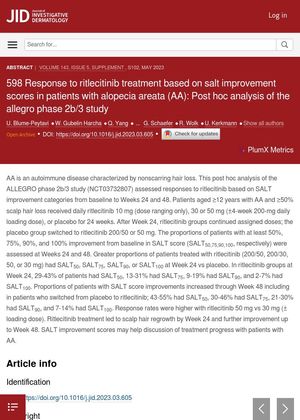Response to Ritlecitinib Treatment Based on Salt Improvement Scores in Patients With Alopecia Areata: Post Hoc Analysis of the Allegro Phase 2b/3 Study

TLDR Ritlecitinib significantly improves scalp hair regrowth in alopecia areata patients over time.
This post hoc analysis of the ALLEGRO phase 2b/3 study evaluated the efficacy of ritlecitinib in patients aged ≥12 years with alopecia areata (AA) and ≥50% scalp hair loss. Patients received varying doses of ritlecitinib or placebo for 24 weeks, with the placebo group switching to ritlecitinib thereafter. By Week 24, a higher proportion of patients treated with ritlecitinib achieved significant improvements in SALT scores compared to placebo, with 29-43% achieving SALT50, 13-31% achieving SALT75, 9-19% achieving SALT90, and 2-7% achieving SALT100. These improvements continued through Week 48, with 43-55% achieving SALT50, 30-46% achieving SALT75, 21-30% achieving SALT90, and 7-14% achieving SALT100. The study concluded that ritlecitinib treatment leads to significant scalp hair regrowth, with higher doses yielding better results.
